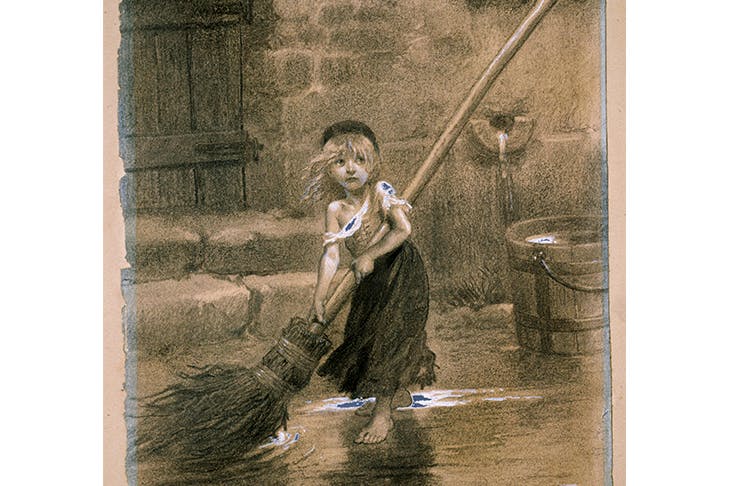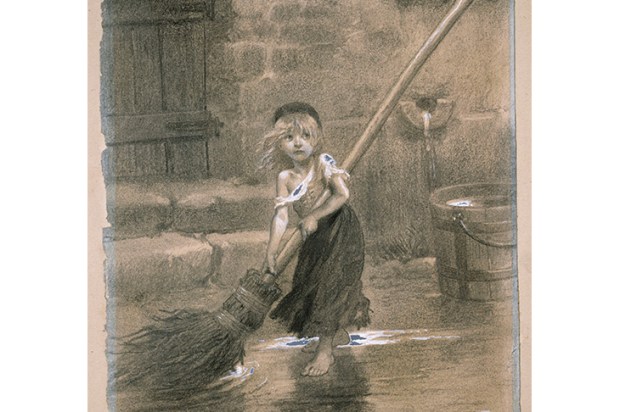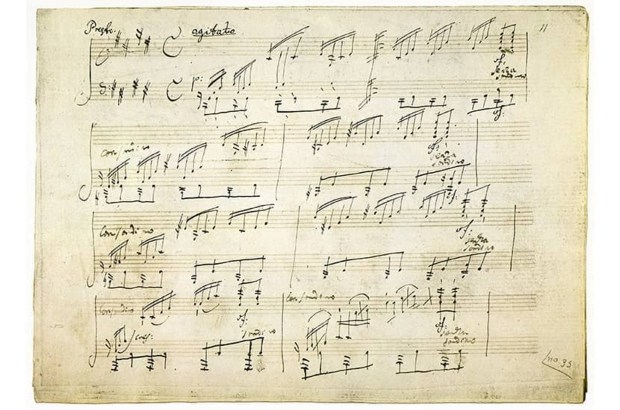Somewhere between his first and second drafts, Victor Hugo decided to change the title of his great novel from Les Misères to Les Misérables, shifting the focus from society’s problems to the people suffering them. And what problems they were. Hugo had never been brutally poor himself, but he’d borne witness to enough brutal poverty around him to know it was real, and to understand what it did to people. He knew, too, how ill-equipped his society was to help the poor, or to fix the causes of their predicament. Not least because in the 1840s, when he started writing Les Misères, only land-owning citizens voted, so as long as the poor didn’t create trouble they weren’t a constituency in whom politicians were especially interested.
Hugo’s novel, then, is a rare voice for the unfortunate, the impoverished, the wretched, the cast-out — all these people were right there in his new title. (The fact that his Misérables includes all those meanings explains why it’s almost unique as a foreign title we don’t even bother trying to translate.)
Though Hugo set his novel in the near historical past, it feeds on his experiences of his own turbulent times, and the questions it asks are perennials: we know there are people who need our help, but how do we best help them? One of Hugo’s solutions is not charity but the dignity of even the most menial wage-slave job. Poverty, Hugo knew, makes staying good even more difficult, and the book is also about where that goodness (modelled by Bishop Myriel) is to be found. And it is possible: even the taciturn ex-con Jean Valjean, a hard worker, builds a respectable civic life for himself.
Les Misérables is about the revolutionary change that Hugo saw his society and politics desperately needing, and to which he expected his book to contribute. By the time he’d finished it, he had lost his respected position in the Paris political sphere and was living in exile, so writing was his sole means of influencing the world. Hugo’s belief that his book might help to change his country tells us something about his confidence in his abilities, certainly; but it tells us that he was an optimist, too, with an unquenchable belief that societal change really was possible. His own political position was always complex — with ambiguous allegiances, and sometimes fierce ambivalence — but this book had room for it all.
Hugo’s aspirations, in truth, were huge, and he needed a more than usually generous-sized and capacious story to meet them. Stack up Great Expectations, Moby-Dick and Crime and Punishment all together and you’ll get some idea of the scale of Les Misérables. It has subplots as long as many novels, it has digressions, essays on historical events, but all of them, argues David Bellos in his new book, are essential: ‘The story of Les Misérables is like a path through a forest — but the forest is as much the subject of the novel as the path.’ If all you know of the book is what fits into a three-hour West End show, you’ll be surprised what you might find here.
Bellos’s own digressions aren’t on the scale of Hugo’s, but they’re there nonetheless; he has interludes about colour, the significance of coinage denominations, vehicles, character names, each of them illuminating a part of Hugo’s world and his book. He’s interested especially in those things Hugo chooses not to explain because he can assume his readers’ prior understanding, and what these silences reveal to us.
The Novel of the Century describes the preoccupations that Hugo used his fiction to express, how he came to understand poverty and the need for social change; but it’s about his writing process, too. Once the huge deal had been signed (enough money ‘to endow a chair at the Sorbonne or to build a small railway’), and the ragged-edged manuscript shipped off to the publisher, we’re given a genuinely fascinating chapter following the back-and-forth logistical hassles involved in correcting the proofs, with the typesetting being done in Brussels and each individual page making a sometimes unpredictable journey to Hauteville House, the author’s home on Guernsey, to be checked over, only for him to decide he wanted to change everything again.
Bellos touches on what some see as the novel’s weaknesses, both in structure and style (those sometimes terrifying sentences of ‘opulent’ prose), forgiving everything by explaining it, showing how he finds it all deliberate. His occasional overblown claim notwithstanding, Bellos’s near-unmitigated zeal is convincing, and itself part of the pleasure of the book; and he’s a knowledgeable, attentive reader, and an engaging storyteller himself, alert to vivid detail. (Hugo bought paper of slightly different sizes in Paris and Guernsey, hence that ragged-edged manuscript.) Any reader who hasn’t yet embarked on Hugo’s book might be converted to the idea by this one.
Got something to add? Join the discussion and comment below.
Get 10 issues for just $10
Subscribe to The Spectator Australia today for the next 10 magazine issues, plus full online access, for just $10.














Comments
Don't miss out
Join the conversation with other Spectator Australia readers. Subscribe to leave a comment.
SUBSCRIBEAlready a subscriber? Log in